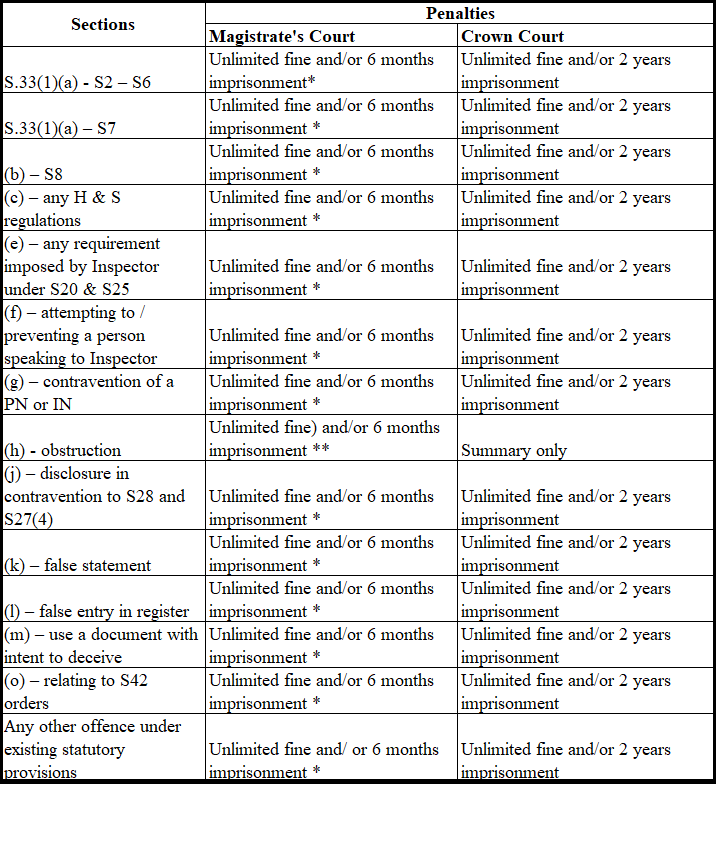Therefore, whenever you're on-site, you've got a duty to your workers, and negligence in that could lead to several years of imprisonment. In addition to this, you can be subject to thousands of pounds of fine or even both, i.e., imprisonment and fine.
There are different penalties on different accounts of wrongdoing under various health and safety laws. In this post, we'll share the main offences and some accidents in which they were implemented. The main focus will be on the Health and Safety at Work etc. Act 1974. Let's get started!
Lack of Safety Equipment on Site
These requirements aren't just essential on humanitarian grounds, but they are also emphasised in sections 2 to 6 of HSWA 1974, which you can read here to learn more details.
Norman McKenzie skimmed on this, which led to the death of Petyo Hristanov in January 2015 in County Armagh. The victim was nailing down metal sheeting on the roof in rainy conditions, without any safety equipment or safeguards in place, leading to his fall to death. Initially, Mr McKenzie was given a 15-month sentence with a £3,000 fine. Later, the fine was removed, and the sentence was increased to two years.
Negligence in Ensuring the Safety of On-site Workers During Construction/Demolition
Paramjit Singh, a builder working on a garage demolition in Chilworth, Hampshire was sentenced to three years in jail due to gross negligence manslaughter when a wall collapsed on a man under his employment. His team had demolished three walls of the garage, and the fourth one was remaining, which Paarmjit brought down with a digger onto the labourer.
In addition to the above sentence, he was sentenced to 20 more months of jail for the violation of sections 2 and 3 of HSWA 1974. These sections talk about the health and safety information, instruction, training, and supervision of employees, and provision of necessary safety equipment.
In a similar breach of HSWA 1974, two Northamptonshire construction workers, Andrew Winterton and Dean Wortley were sentenced to four years in jail and a £90,500 fine, and 12 months in jail and £20,000 fine, respectively. They were charged with gross negligence manslaughter when Shane Wilkinson died due to an unsecured trench wall's collapse in Collyweston. The site missed the very basic safety measures, such as barriers and support for trench walls.
Testing and Safety of Machinery and Necessary Training of Operating Personnel
These regulations were violated by Master Construction Products in 2015 when they failed to implement a safe system of work for the machinery on site. This led to the death of a worker when he was crushed by a machine sorting waste material. The company was fined £255,000.
Similarly, the Swansea Crown Court sentenced Project Manager at TSD group, Graham Kuhlmann, to 21 weeks of a custodial sentence, with 12 months of suspension, and a £5,000 fine, for lacking health and safety management on-site, and hiring unsuitable machinery and untrained operators. The sole director, Kevin March, of the prime contractor, Pro'conn Limited, was also sentenced on similar grounds. He received 32 weeks custodial sentence, 12 weeks suspension, and £20,000 in fine.
Graham Kuhlmann and Kevin March's negligence in hiring appropriate machinery and trained personnel led to the death of a vehicle operator in West Aberthaw, Vale of Glamorgan, when it overturned due to the machine's limited operating capacity.
Negligence in Safety of Off-site People
Kelvin Adset, the supervisor at IS Europe Ltd, failed to ensure this on his site leading to the death of a 43-year-old lawyer, Amanda Telfer, when half a ton of large unglazed frames collapsed on her as she was walking by the construction site in Hanover Square, central London. Kelvin was sentenced to 12 months in prison, whereas, the site manager, Damian Lakin-Hall, was sentenced to 6 months.
In addition to the above prison sentences, the construction contractor, IS Europe Ltd., was also charged with a fine of £100,000.
The accident could have been avoided by implementing a few simple safeguards, such as the usage of straps to keep the frames from moving or placing barriers to warn the passers-by that there's a construction site ahead that might not be safe.
Breach of Improvement Notice or Prohibition Notice
Similarly, they can also serve an 'improvement notice' to improve the health and safety situation on-site. If you fail to follow the instructions, you might end up in some serious hot waters.
A site manager, in Birmingham, committed this crime when he neglected a prohibition notice by HSE inspectors that directed him to close any work done at height. His continuation of work, regardless of two visits by the HSE inspectors, led to the death of a window fitter when he fell from the first-floor roof.
Police investigations showed that the construction manager was skimming on numerous health and safety requirements on-site, for instance, unguarded openings on the first and second-floor ceilings, absence of protective clothing for the labour, and unsafe scaffolding.
The site manager was charged with manslaughter by gross negligence. The Birmingham Crown Court ordered a 30-month jail sentence for him.
Negligence in Following Risk Assessments
Conrad Sidebottom and Richard Golding, who were working as the Commercial Director of Siday Construction Ltd and an independent health and safety contractor, respectively, violated this law on their project in Ellersby Street, Fulham, leading to the death of a labourer, Anghel Milosavlevici.
Even though they recognised that there were threats on-site and created a risk assessment, they failed to place any safeguards to avoid the unfortunate accident. The project involved adding a lower ground floor to a semi-detached Victorian house, which required excavation in the basement. The excavation was done via underpinning, in which a section is excavated, and concrete piles are placed for support. The piles weren't placed properly and led to the collapse of the basement resulting in Anghel's untimely death.
HSWA 1974 Offences Punishable by Jail



